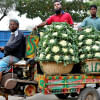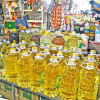Economy bleeds while reality only getting harsher for people

Russia's war in Ukraine might be taking place 5,800 kilometres away from Bangladesh and the country is not involved militarily in the dragging conflict in any way, but its economy and people have been paying heavy prices.
The war, which began on February 24 last year, has hit Bangladesh's robust economic recovery from the coronavirus pandemic. The economy grew at a slower-than-expected pace in the last fiscal year and the growth might decline further in the current financial year as well.
Inflation has stayed at an elevated level after surging to a multi-year high in August owing to global supply disruptions, higher import costs and a spike in fuel, gas and electricity prices. Higher consumer prices have hit hard the poor and the fixed-income groups disproportionately since their earnings did not rise in line with the expenses, forcing them to slash consumption, both food and non-food.
The war-induced higher global commodity prices and slowdown in external demand have led to a sharp widening of the current account deficit, depreciation of the taka and a decline in foreign exchange reserves.
The taka, which was under pressure even before the war began, lost its value by about 25 per cent against the US dollar since February last year, driving up the cost of imports in a country that relies on external sources for 80 per cent of wheat, nearly 100 per cent of crude oil and processed petroleum products, a majority of fertiliser, edible oil and sugar.
The forex reserves were down by 28 per cent.
The global energy crisis prompted the government to close diesel-fueled power plants, introduce rolling blackouts and cancelled the purchase of liquefied natural gas from international spot markets, affecting households and factories alike.
In order to tame the pressure on state coffer, the prices of fuel, fertiliser, gas and electricity were raised in an unprecedented manner. But the pressure did not go away.
Owing to higher global prices, importing the same volume of nine essential commodities -- crude oil and refined oil, LNG, wheat, fertilizer, palm oil, coal, soybean oil, maize and rice – was expected to cost an additional $8.2 billion in 2022 in comparison to 2021, according to the budget speech of the finance minister in June.
Exports shot up to a record high in the last financial year, which ended in June, riding on pent-up demand. But the shipment growth is expected to slow in line with falling demand in Europe and the United States, which together account for nearly 80 per cent of the country's total external demand.
Remittances are not rising to the expected level although Bangladesh sent a record number of workers abroad last year.
Rising prices of fertiliser may cause some farmers to reduce their use of the input, leading to lower agricultural production and higher food prices at a time when the world is facing a food crisis.
According to the Agricultural Market Information System, an inter-agency platform based in Rome, fertiliser prices have decreased 40 per cent since hitting record nominal highs last spring. Still, prices remain nearly twice their level of two years ago.
And Mokhlesar Rahman, a farmer in Bogura, told The Daily Star yesterday: "This was the first time in many years, we have had to buy fertiliser by standing in line."
The war has hurt the employment sector since businesses have adopted a wait-and-see approach when it comes to investments as uncertainty persists.
Falls in employment are larger than those in GDP at 1.6 per cent, said the International Food Policy Research Institute (IFPRI) in a paper on the impacts of the war on Bangladesh's economy in July.
"Overall, the combined effect of the world price shocks is a decline in consumption for all households, with larger declines for households toward the lower end of the income distribution. The result of the global crisis is, therefore, an increase in inequality within Bangladesh."
Falling household consumption leads to greater poverty, particularly in rural areas. According to the most recent household survey in Bangladesh, 14 per cent of the country's population has an adult equivalent consumption level that falls below the $1.90 poverty line.
The increase in world prices raises the national poverty headcount rate in Bangladesh by 3.3 percentage points, equivalent to an additional 5 million people falling below the poverty line, said the IFPRI.
The heightened uncertainty has forced Bangladesh to turn to the International Monetary Fund (IMF) for support with a view to tackling macroeconomic instability and protecting the vulnerable. The lender has approved a $4.7 billion fund.
The war also showed how important it has been for Bangladesh to bring in structural reforms in some areas that have been neglected for years.
Ahsan H Mansur, executive director of the Policy Research Institute of Bangladesh, says that the global commodity market has almost absorbed the price shock emanating from the war-induced crisis. But Bangladesh has failed to contain the prices in the domestic market.
Although the price of fertiliser has decreased significantly in recent times, there is still uncertainty. Russia, Ukraine, and Belarus are the key producers of fertilisers globally.
The price of LNG has decreased to a tolerable level in the global market as well.
"Good things are happening in the global market. But they have not brought any major impact to our economy as we have not taken any time-befitting initiatives after the war," he said.
"We have failed to absorb the shock. And the common people are now suffering because of the wrong decisions taken by the policymakers."
According to Mansur, uncertainty is deepening amid the dollar crisis.
"The central bank should have allowed the floating exchange rate and withdrawn the cap on the lending rate."
The former official of the IMF suggested taking measures to help the country ride out the crisis.
"If we don't take the issue with the utmost importance, the economy will fall into deep trouble in the days to come."
Mustafizur Rahman, a distinguished fellow at the Centre for Policy Dialogue, says that the country is facing imported inflationary pressure derived from the price hike in the global commodity market.
"This has worsened the living standard of the people. And the global supply chain disruption has threatened the food and energy security of the country."
He said Bangladesh was now in a critical condition because of the ongoing geopolitical tension.
"It is difficult for us to side with any particular county. The tension has even brought a negative impact on the implementation of development projects."
Zahid Hussain, a former lead economist of the World Bank Bangladesh, said there was no alternative to increasing the supply of US dollars.
"Only administrative measures on import controls will not bring much benefit."
He said the exchange rate volatility has shown that attempts to manage it artificially might not work ultimately.
"In fact, since the dollar rate for remittances was left largely to the market, money sent home by our workers has started picking up."
The economist recommended examining how the country could cut tax exemptions.
Bangladesh would have to see how it could explore natural resources such as gas in order to cut the country's heavy reliance on imports, Hussain added.


 For all latest news, follow The Daily Star's Google News channel.
For all latest news, follow The Daily Star's Google News channel. 










Comments